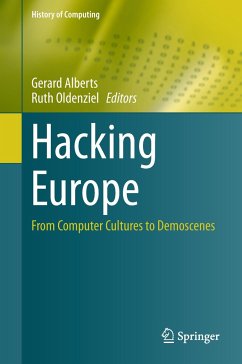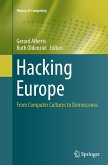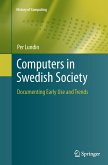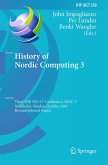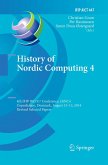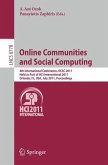Hacking Europe traces the user practices of chopping games in Warsaw, hacking software in Athens, creating chaos in Hamburg, producing demos in Turku, and partying with computing in Zagreb and Amsterdam. Focusing on several European countries at the end of the Cold War, the book shows the digital development was not an exclusively American affair. Local hacker communities appropriated the computer and forged new cultures around it like the hackers in Yugoslavia, Poland and Finland, who showed off their tricks and creating distinct "demoscenes." Together the essays reflect a diverse palette of cultural practices by which European users domesticated computer technologies. Each chapter explores the mediating actors instrumental in introducing and spreading the cultures of computing around Europe. More generally, the "ludological" element--the role of mischief, humor, and play--discussed here as crucial for analysis of hacker culture, opens new vistas for the study of the history of technology.
"Hacking Europe fills a glaring hole in the history of computing. ... Hacking Europe enterprise opens a whole new area of research, one that could strengthen many adjacent areas of investigation. ... Hacking Europe delivers consistent structure, points, and purpose across diverse articles, all in all contributing to the historically specific, geographically aware, use-centered study of computing cultures." (Maxigas, IEEE Annals of the History of Computing, Vol. 38 (3), July-September, 2016)
"Hacking Europe should pique the curiosity of anyone interested in Cold War technoscience. ... Both readers familiar with history of computing literature and those interested in modern Europe are guaranteed to find something unexpected here ... . Beyond the abundance of original material in each of the nine individual chapters, the contributions and an editorial piece in combination present a number of thought-provoking puzzles for a historian of modern science." (Ksenia Tatarchenko, ISIS, Vol. 107 (2), June, 2016)
"The wealth, diversity and international character of the contributions makes the volume an extraordinary insightful and entertaining read ... . Given the popularity of approaches towards social (co-)construction of technology, one can hope that the assembled contributions will spur a stronger interest in the history of home computers, their social meanings, and the subcultures that arose around them. In this domain, this volume will always remain a milestone." (Gleb J. Albert, European History Quarterly, Vol. 46 (1), 2016)
"Hacking Europe should pique the curiosity of anyone interested in Cold War technoscience. ... Both readers familiar with history of computing literature and those interested in modern Europe are guaranteed to find something unexpected here ... . Beyond the abundance of original material in each of the nine individual chapters, the contributions and an editorial piece in combination present a number of thought-provoking puzzles for a historian of modern science." (Ksenia Tatarchenko, ISIS, Vol. 107 (2), June, 2016)
"The wealth, diversity and international character of the contributions makes the volume an extraordinary insightful and entertaining read ... . Given the popularity of approaches towards social (co-)construction of technology, one can hope that the assembled contributions will spur a stronger interest in the history of home computers, their social meanings, and the subcultures that arose around them. In this domain, this volume will always remain a milestone." (Gleb J. Albert, European History Quarterly, Vol. 46 (1), 2016)

